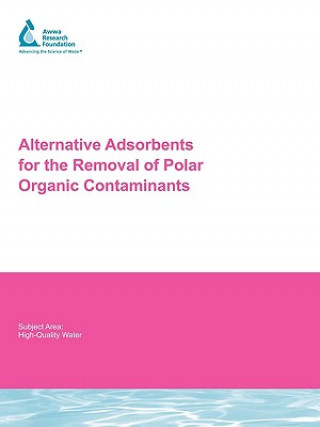
Kód: 08845421
Alternative Adsorbents for the Removal of Polar Organic Contaminants
Autor Detlef R. U. Knappe, Alfred Rossner, Shane A. Snyder, Cliff Strickland
The removal of polar and ionizable organic contaminants is an emerging concern in the production of safe drinking water. Activated carbon adsorption is one treatment strategy to remove such contaminants, but high carbon usage rate ... celý popis
- Jazyk:
 Angličtina
Angličtina - Vazba: Brožovaná
- Počet stran: 136
Nakladatelství: IWA Publishing, 2007
- Více informací o knize

Mohlo by se vám také líbit
-

Dune
216 Kč -

Haunting Adeline
621 Kč -

Berserk Deluxe Volume 2
1092 Kč -

White Nights
89 Kč -

Powerless
268 Kč -

Atomic Habits
330 Kč -

Dune Messiah
228 Kč -

Berserk Deluxe Volume 3
1142 Kč -

One Day
221 Kč -

Berserk Deluxe Volume 1
1115 Kč -

Iron Flame
368 Kč -

Surrounded by Idiots
213 Kč -

Harry Potter and the Prisoner of Azkaban (Minalima Edition)
993 Kč -

Gravity Falls Journal 3
443 Kč -

Heaven Official's Blessing: Tian Guan Ci Fu (Novel) Vol. 1
420 Kč -

The Creative Act
568 Kč -

Dune
276 Kč -

Hunting Adeline
624 Kč -

A Little Life
290 Kč -

Children of Dune
230 Kč -

Heaven Official's Blessing: Tian Guan Ci Fu (Novel) Vol. 2
427 Kč
Informovat o naskladnění knihy
Zadejte do formuláře e-mailovou adresu a jakmile knihu naskladníme, zašleme vám o tom zprávu. Pohlídáme vše za vás.
Více informací o knize Alternative Adsorbents for the Removal of Polar Organic Contaminants
 Anotace knihy
Anotace knihy
The removal of polar and ionizable organic contaminants is an emerging concern in the production of safe drinking water. Activated carbon adsorption is one treatment strategy to remove such contaminants, but high carbon usage rates may be required to meet treatment goals. Recently published data showing that high-silica zeolites and carbonaceous resins exhibit higher MTBE adsorption capacities than activated carbons served as a motivation for a systematic evaluation of alternative adsorbents in this study. The overall objective of this research was to compare the effectiveness of alternative adsorbents such as high-silica zeolites and carbonaceous resin to that of granular activated carbon (GAC) for the removal of methyl tertiary-butyl ether (MTBE) and emerging organic contaminants such as pharmaceutically active compounds and endocrine disrupting chemicals from drinking water sources. Apart from niche applications, in which the removal of a specific contaminant such as MTBE is targeted, alternative adsorbents such as high-silica zeolites and carbonaceous resin cannot compete with the effectiveness of activated carbon. Activated carbon will continue to be the most effective broad-spectrum adsorbent for the removal of organic contaminants from drinking water. Isotherm results obtained in this study showed that an activated carbon dose that might typically be added for taste and odor control (10 mg/L) is sufficient to achieve a 2-log removal of many emerging organic contaminants.
 Parametry knihy
Parametry knihy
Zařazení knihy Knihy v angličtině Technology, engineering, agriculture Environmental science, engineering & technology Pollution control
- Plný název: Alternative Adsorbents for the Removal of Polar Organic Contaminants
- Autor: Detlef R. U. Knappe, Alfred Rossner, Shane A. Snyder, Cliff Strickland
- Jazyk:
 Angličtina
Angličtina - Vazba: Brožovaná
- Počet stran: 136
- EAN: 9781843398288
- ISBN: 9781843398288
- ID: 08845421
- Nakladatelství: IWA Publishing
- Hmotnost: 332 g
- Rozměry: 280 × 209 × 8 mm
- Datum vydání: 01. November 2007
Osobní odběr Praha, Brno a 12903 dalších
Copyright ©2008-24 nejlevnejsi-knihy.cz Všechna práva vyhrazenaSoukromíCookies



 Vrácení do měsíce
Vrácení do měsíce 571 999 099 (8-15.30h)
571 999 099 (8-15.30h)